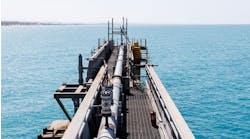Fifty years ago this year, the North Sea became the focal point across the global oil and gas industry. Back then, the industry looked to America for the skills and experience to pull hydrocarbons out of the ground. Fast forward through these last five decades, as well as Aberdeen being bestowed with the "Oil and Gas Capital of Europe" moniker, the skills and knowledge in the North Sea has grown exponentially and has never been in such high demand, both domestically and internationally.
Much has been written about the sustainability of the talent pool in the North Sea. Questions include:
- What can be done to ensure the industry does not lose any of that expertise as retirement beckons for the most experienced in the workforce?
- Will the industry be left with contract personnel who move from company to company, taking their skills and experience with them?
- Is enough being done at grassroots level to encourage a continuous pipeline of fresh, willing, and capable bodies?
As 2015 unfolds, the gauntlet being thrown down to employers is to maintain this momentum and not take their foot off the gas when it comes to investing in skills despite some challenging economic times in the months ahead.
The recent "Fueling the Next Generation" report commissioned by Oil & Gas UK, OPITO, and the Department for Business, Innovation and Skills showed the scale of the skills shortage is much less than it was 12 to 18 months ago. The good news is that despite the North Sea being a mature basin, there will be a need for 12,000 new entrants between now and 2019.
The report also showed that the industry could lose up to 35,000 people over the next five years. While this may at first sound alarming, it needs to be taken in context.
This is a sector, like so many others, that has endured many peaks and troughs depending on an array of variables such as prices and other market trends. The forecast reduction in jobs stems from the anticipated decline in capex and the number of workers expected to retire over the same period.
Companies are well aware of how vital it is to have the next generation trained by those who have been working in the industry for many years in order for the North Sea to remain as one of the major regions for oil and gas activity.
The report confirmed this; businesses are putting in the effort to ensure the in-house stream of talent for the future is working. Almost 90% have implemented training and mentoring programs with 6,000 graduates and 13,000 apprentices currently employed in the sector.
Young people are the future and the industry must continue to encourage and foster this talent whether it is in the workplace, learning through modern apprenticeship schemes, or making sure higher education institutes are designing courses to fully support these students with the right tools for moving straight into full-time employment.
The steady flow of skilled and passionate personnel will also come from adult returners, military personnel leaving the armed forces, and those wishing to start on a new career path. It is not only just the engineers and lab-based personnel that are required, but also lawyers, medics, accountants, and office support roles.
The industry has been working hard to attract more women into what was once seen as very much "a man's world." The number of women in the oil and gas sector has risen to now make up 25% of the workforce. However, the national UK average is 47%.
One area to celebrate in 2015 is the home-grown research and development teams. This sector is constantly pushing boundaries forward to discover new techniques and processes for developing new enhanced oil recovery techniques.
Going forward, there will also be scope for new opportunities in other disciplines such as the digitalization of oil fields, higher investment in technology, not to mention the increase in decommissioning work.
The North Sea's talented people are already highly sought after in international waters with nearly 30% of workers engaged in overseas activities. This figure is expected to keep rising, but the responsibility is on the industry to keep the quality and workmanship as alive and kicking as the North Sea region itself.
John McDonald
UK Managing Director
OPITO
This page reflects viewpoints on the political, economic, cultural, technological, and environmental issues that shape the future of the petroleum industry. Offshore Magazine invites you to share your thoughts. Email your Beyond the Horizon manuscript to David Paganie at[email protected].


